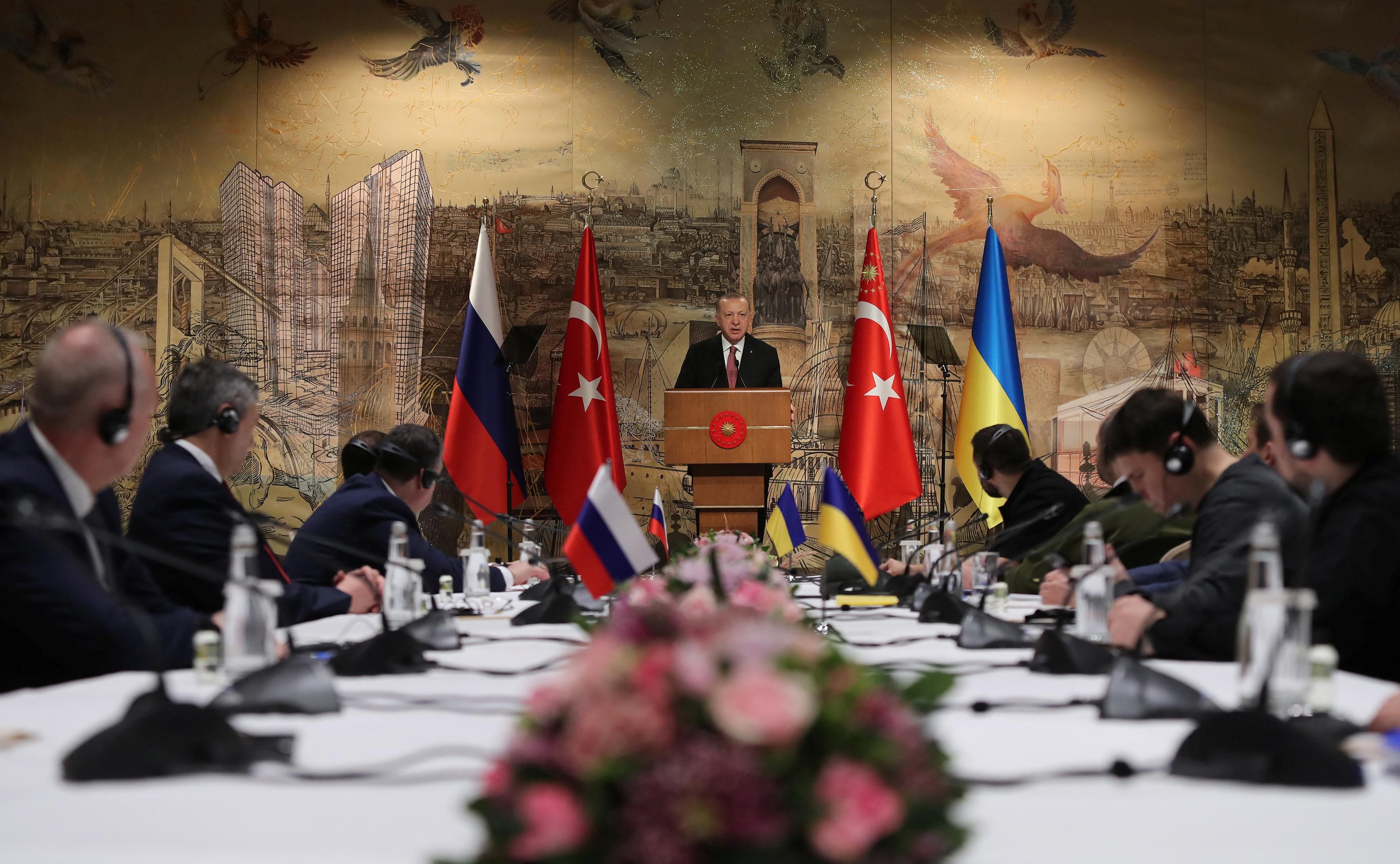Turkish President Tayyip Erdogan addresses Russian and Ukrainian negotiators before their face-to-face talks in Istanbul.
Murat Cetinmuhurdar via REUTERS
Russian and Ukrainian negotiators talked peace in Istanbul on Tuesday. Should we be optimistic or skeptical?
The case for optimism
- “Meeting jaw to jaw is better than war,” said Winston Churchill in 1954. In this case, the war in Ukraine continues even as talks begin, but given the number of lives that remain in the balance, any chance at peace must be pursued.
- It appears progress was made. The Turkish hosts say Russian and Ukrainian foreign ministers will meet next. If they can produce a draft agreement, the Russian government says President Vladimir Putin could speak directly with President Volodymyr Zelensky.
- Ukraine has offered important concessions. It’s willing to discuss “neutrality,” a pledge to not join NATO. It has also signaled that the future of Crimea, annexed by Russia in 2014, and the Donbas, where separatists have declared independence, are fair game for discussion.
- Russia said Tuesday it will “radically reduce” its combat operations near the cities of Kyiv, the capital, and Chernihiv. A pledge to reduce fighting anywhere, whatever the motive, can save many lives.
- These tentative concessions suggest they both have good reason to halt the war. On both sides, thousands have died, and tens of thousands more lives are at risk. The economic damage to both sides – the physical destruction of Ukraine and historically tough sanctions against Russia – can become much worse without either side scoring a win.
The case for skepticism
- Talk is cheap. Military leaders look at the other side’s capabilities, not its stated intentions. Russia says it will back off Kyiv. Putin also said he wouldn’t invade Ukraine.
- The Russians say a pullback from Kyiv and Chernihiv is meant to “boost mutual trust” for peace talks. But how much trust can Ukrainians have while Russia continues to pound the southern cities of Mariupol, where Zelensky says Russians are committing war crimes, and Mykolaiv, where Russian shelling blew a hole through a government building even as talks were underway in Istanbul?
- Ukraine won’t agree to “neutrality” without security guarantees from other countries. Poland, Israel, Turkey, and Canada have been suggested as possible guarantors. Will Russia agree that NATO countries can guarantee Ukraine’s security?
- Putin’s invasion has made Zelensky a national (and international) hero, but it still won’t be politically easy for him to bargain away land that Ukrainians are fighting and dying for.
- Moscow understands that a peace deal with Ukraine won’t immediately end all Western sanctions on Russia’s economy or plans to relieve European dependence on Russian energy. Those actions were taken to defend European and US interests, not simply to help Ukraine.
- What is Russia’s true objective in Ukraine? BBC’s Russia editor Steve Rosenberg reported on Tuesday that Russian “state TV’s flagship weekly show” broadcast on Monday evening an extended quote from a Russian philosopher from the 1930s: “Russia cannot and must not lose Ukraine … it must be a part of Russia, even against Ukraine’s will.” Russian actions and the broadcast of this message on state TV suggest that key people in Russia’s government agree with this idea. If that’s Russia’s true goal, then peace talks are a diversion.
From Your Site Articles
